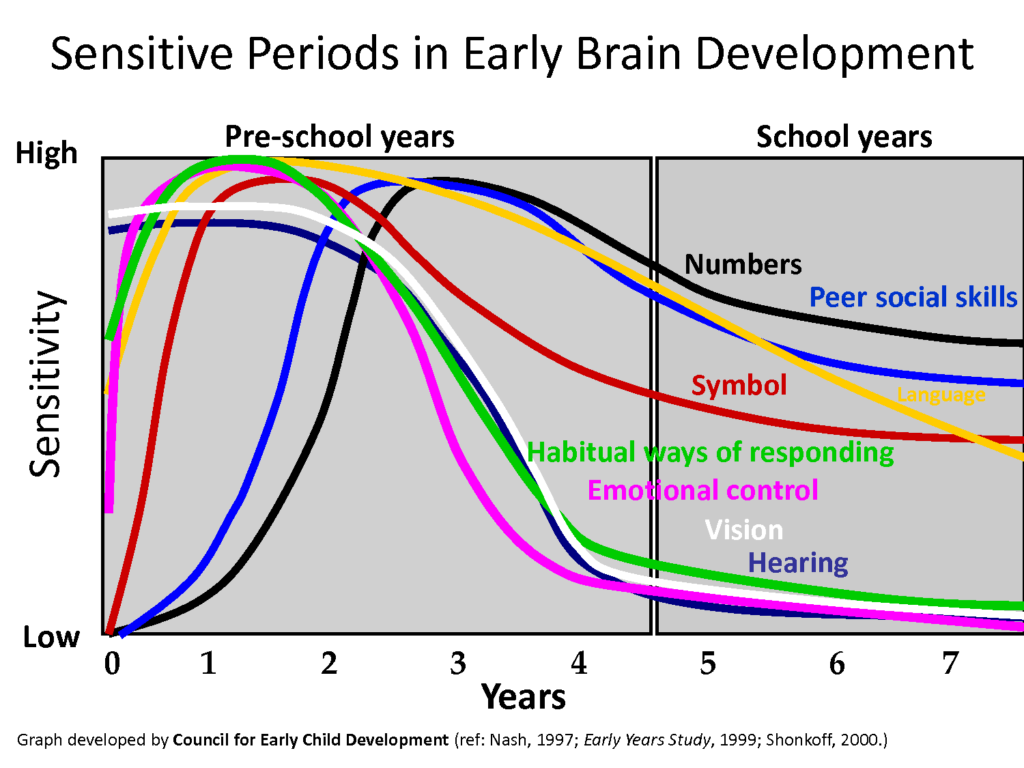Early Childhood Care and Education in India encapsulates the period from conception through eight years of age. The first eight years of a child’s life are critical. Since the rate of development in 0-8 years is more rapid than at any other age, significance of early years is beyond debate in today’s world. Research in neuro-science confirms the importance of the early years in a child’s life particularly since 85% of brain development has already taken place by the time a child is six years of age.

There are certain ‘sensitive periods’ or ‘critical periods’ (Figure above) for development of cognitive, linguistic, social and psychomotor competencies and for sure, exposure received in early years thus defines the success of human life to a great extent. It is an indispensable foundation for lifelong development and learning, and has lasting impact on human life.
A study conducted by the National Council of Educational Research and Training (NCERT) titled “The impact of pre-school education on retention in primary grades” (1992) on 30,000 children illustrated strong relationship between exposure to pre-school education and retention rates, attendance rates, and most significantly learning outcomes in primary school and beyond. For all these reasons – from rapid development to school-preparedness, higher numeracy and literacy, employability, and eventual growth of the country – India absolutely need to invest in accessible and quality ECCE for all children.
This need of investment in Early Years is very well viewed under the new policy that government of India is proposing. The year of 2020 is of great importance for journey of ECCE in India as the National Education Policy (NEP) proposes major reconfiguration of curricular and pedagogical structure for early years as an integral part of school education in India. This integration of ECCE in formal schooling was long awaited.
The present policy begins with viewing ECCE as a part of the Foundational stage of school education (three years of pre-primary education and Grades 1 and 2), a single curricular and pedagogical phase of play- and discovery-based learning for very young children, between the ages of 3-8 years. The emphasis on accessible education in early years can be turning point for adversities seen in current Indian education system but government of India needs to take certain measures with immediate effect for this critical Foundational Stage of a child’s development.
To take suggestions of NEP to the light of success, first, investment in quality educators is the need of the hour for India. Apart from working on ‘What and How’ of pedagogical functioning, a preschool educator needs to focus on ‘Why’ element of teaching. A teacher needs to know the reason of singing songs and doing art and craft with young children in classrooms. And therefore, a thorough curriculum for teacher training and career mapping through established institutes is required for teachers across Anganwadis and private preschools in India. Though NEP takes into account the point of in job- training of educators but the ground reality is that teacher training curriculum in India has not changed from last 40 years. The new age teaching techniques demand heavy investment from policy perspective in this direction.
Worthy to mention here is also to invest in emotional health of preschool educators through these trainings as they are building the foundational stage of human life. To develop a mind, you need a calm mind. Children learn best in stress free and playful environment. Be it home or be it in classroom, the best brain functioning of human life is always recorded in cheerful and stimulating environment through various studies. Children silently perceive the behavioral pattern of adults in almost every single task, and therefore, investing in emotional health of teachers is something that NEP has to build focus on.
Apart from investment in teacher preparations, India struggles in the quality of early exposure given to young children in villages as compared to cities. Strengthening and expansion of the Anganwadi system, Co-locating Anganwadis with primary schools and Co-locating pre-schools with primary schools (where possible) are some of the measures recommended in NEP 2020. A very positive note coming through that but a word of caution here though: In a diverse country like India, implementation of such policy measures is a very difficult task. Until and unless, quality childcare and preschool programs are reaching to farthest corners of the country, this vision of development for all seems far fetched dream.
Significance of well paid professionals in ECCE with higher degree of ethics and commitments is not much talked in current draft of NEP but that’s where the hidden treasure lies. ‘Walk the talk’ is the way to go. To instil right value system in citizens of this country, adults need to follow best practices today. Children of 0-8 years learn best when they see it happening around them. Hopefully, NEP will bring that new ray of hope that will motivate more and more dedicated citizens to join the cause.
If well-implemented and well-timed, NEP can bring revolution in Indian Education system but if not done with due diligence, India might lose another generation to redundant knowledge!
